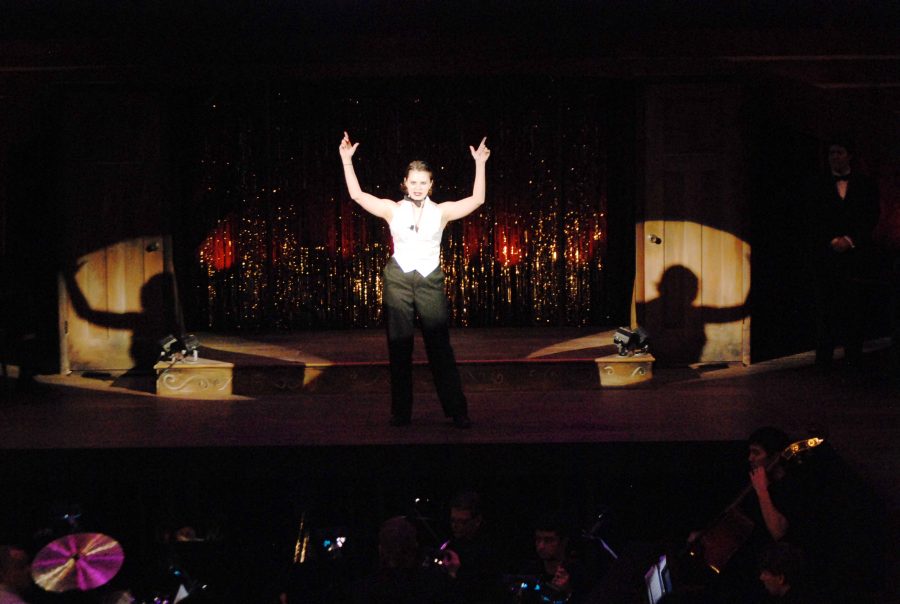“Leave your troubles outside! So, life is disappointing? Forget it! We have no troubles here! Here, life is beautiful…The girls are beautiful…Even the orchestra is beautiful!” proclaimed the emcee in the opening number in last weekend’s Evergreen Players production of Cabaret. For most people in the audience this appeared to be true; for over two hours a packed McManus Theatre sat enthralled by the production.
Kander and Ebb’s Cabaret is set in Berlin, Germany, from New Year’s Eve 1929 into early 1930. It focuses on the relationship between English cabaret singer Sally Bowles (Anna DeBlasio) and American writer Clifford Bradshaw (Joe Mucciolo) and other facets of the seedy nightclub, Kit Kat Klub. There is a subplot about the boarding house where Bradshaw lives involving the German owner Fräulein Schneider (Adrianna Trigone) and her suitor Herr Schultz (Benjamin Abraham), a Jewish fruit merchant. The master of ceremonies, also known as the emcee (Rachel Fraczkowski), oversees the entire production. The play is set in the late days of the Weimar Republic, Germany’s attempt at democracy after World War I. The club serves as a metaphor for the Republic falling to the Nazi regime.
The set worked extremely well for the production by placing the orchestra in the center of the stage and allowing action to occur around them. A raised platform sat center stage with two circular staircases descending on each side. There was a small stage under the platform with a metallic curtain as a backdrop. A solid black curtain was pulled out to conceal the metallic curtain during scenes at the boarding house. There were minimal set pieces; just a few tables and chairs moved by the cast.
This musical was the first “concept” musical, which means that the metaphor of the show overrides the narrative. Dr. Natka Bianchini took this notion and used it to craft a production best suited for this stage. “Given the musical’s history of revision, we have taken a degree of liberty with the musical’s libretto—adding, cutting and rearranging music to create our world,” she said in the program.
This creative liberty comes through most obviously with the choice to cast a woman, Fraczkowski, in the male role of the emcee. The role of the emcee is a challenging one as he is the person who glues the entire production together. This is no small role but Fraczkowski rose to the occasion. I could not imagine a better choice for this role. It was hard to tell she was playing a man at first, but eventually that came through, especially with the song “Two Ladies” about two women having a relationship with one man. The one man was the emcee and the two women were played by Brian Lojewski in drag and Maggie Mellott.
Sally Bowles sings some of the most memorable songs from the show and DeBlasio managed to hold her own with the material. Her rendition of “Cabaret” was more emotionally charged and somber than any I have ever seen. She performs the number after she has made an emotional decision to abandon the safety of married life to stay at the cabaret. She proved to be a strong anchor for the cabaret girls. Mucciolo brought likeability to the role of Sally’s bisexual lover. He made the audience want to root for him.
As Fräulein Schneider, Trigone was the person who saw the power of the Nazis but did not believe she had the power to change anything. She turned down the optimistic marriage proposal of Herr Schlutz because he was Jewish and she knew the Nazis would not accept this. Her remorse was conveyed in the song, “What Would You Do?” because she felt there were no other options. Abraham did his best to persuade her that his religion did not matter because of his German heritage but was unable to do so.
The show is a musical showcase for both vocal and dance skills. The Kit Kat Klub Girls and Guys managed to keep their energy high throughout the show. One impressive dance move was when the girls went from performing a kick line to a military march to symbol the changing currents in Germany. Another example of this changing current comes during the Act I finale. This featured Fräulein Kost (Danielle Bonanno) and Ernst Ludwig (Mitch Washburn) leading the cast in a number that illustrated the division between those who supported the Nazis and those who did not.
It was obvious that the cast tried hard to master the German accents in the show, but at times they seemed a bit over the top and almost distracting, particularly in songs.
Loyola only performs a musical every two years so it was nice to see a nearly full house on Friday night. From the production team to the pit band and the cast, everyone’s hard work paid off. It also managed to unite both Loyola theater veterans and newcomers in putting on a great show, where for a few hours, everything was beautiful.













































































































